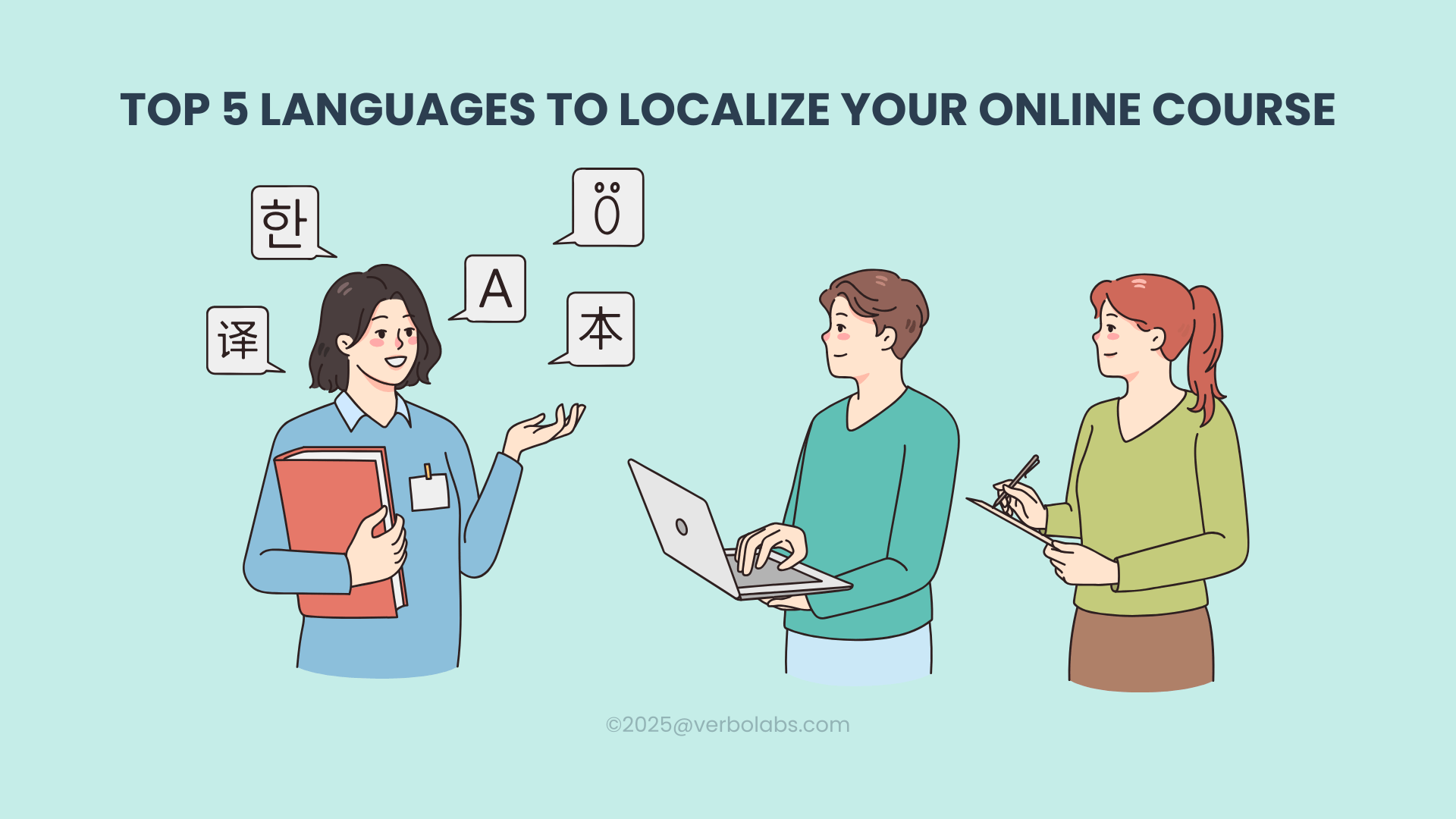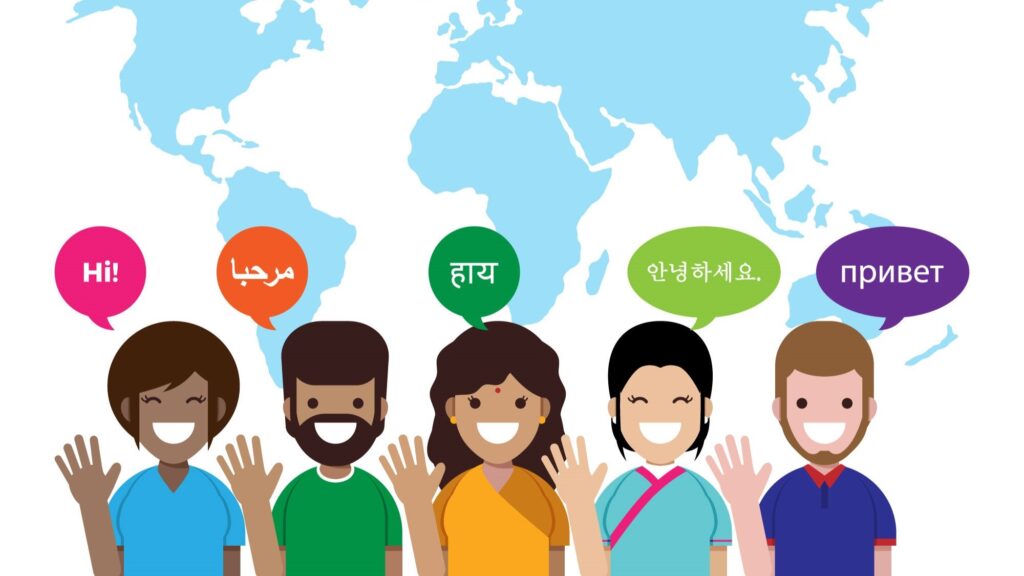
The language market is set to boom in the coming years. According to Global Market Insights, the global eLearning market is projected to reach $375 billion by 2026. If your course is available only in English, you risk leaving millions of learners untapped. By focusing on the right languages to localize online course content, you can meet the demand of highly spoken and in-demand languages that learners actively seek in their preferred course formats.
In the market of translation and localization services, some languages offer the highest ROI because of their large global speaker and reader bases.
Here’s why providing multilingual content to e-learning platforms is a necessary touch and demand to scale up learners, achieve more organic reach, and better align with industry standards in content.
Why Multilingual Content Matters in eLearning?
In E-learning, millions of learners want to learn and access the content in their native languages, at their convenience, and at their preferred time slots. And, if the content is not appropriate according to their cultural norms or they aren’t comfortable enough with the English language, then it’s impossible to convince them to stay on site and enroll in the learning module.
That’s why it’s essential to address the need for multilingual content for E-learning websites and applications. Below are the significant points justifying the multilingual content:
- Broader Reach & Enrollment: Connecting with learners in native languages leads to better comprehension and connectivity.
- Improved Learning Outcomes: Learners absorb faster in their mother tongue rather than a secondary language.
- Competitive Advantage: Localized courses increase brand credibility in regional markets and also gain recognition.
- Compliance & Certification Requirements: Especially in regulated fields like healthcare, IT, finance, business marketing, law & order, travel, logistics & supply chain, there’s a special need for industry experts to manage the content as per the cultural guidelines.
Top 5 Languages to Localize Your Online Course In 2025
Based on native speakers, geographical reach, industry demand, and digital education trends, these are the top 5 languages to focus on and localize online courses in 2025:
1. Spanish
- Native Speakers: With over 500 million speakers across the globe, Spanish is one of the most in-demand languages for translation.
- Regions: It is widely spoken language in Latin America, Spain, and parts of the U.S.
- Industries: More prominent in Healthcare, IT training, ESL, and business courses.
- Why Localize: There is a high mobile learning adoption in LATAM and low English penetration.
2. Mandarin Chinese
- Native Speakers: Spoken and understood by 900+ million people.
- Regions: Accepted in Mainland China, Taiwan, and Singapore.
- Industries: STEM education, corporate training, academic prep, and supply chain.
- Why Localize: There’s a massive e-Learning growth in China with strict government language guidelines to promote the language among the natives.
3. Arabic
- Native Speakers: Almost used by 310+ million individuals.
- Regions: Widely spoken and understood in MENA (Middle East & North Africa).
- Industries: Religious studies, professional development, and government training use this language the most.
- Why Localize: Growing youth population and demand for digital education.
4. Hindi
- Native Speakers: Spoken by 600+ million people around the world.
- Regions: India, Nepal, UAE diaspora, Fiji, and Mauritius.
- Industries: Exam prep, upskilling, entrepreneurship, and several other sectors.
- Why Localize: India’s Tier 2/3 cities have booming demand for local-language courses available online.
5. Portuguese
- Native Speakers: There are around 260+ million people who understand and prefer this language.
- Regions: Brazil, Portugal, and parts of Africa.
- Industries: Required in Tech certifications and vocational training.
- Why Localize: Brazil’s large learner base + growing eLearning market.
Also Read:
- Top Languages Spoken in London: A Cultural Guide
- Top Most Spoken Languages in Canada
- How Many Languages Are Spoken in India?
How VerboLabs Can Help You Localize Online Courses?

There is a high demand for learning courses through online platforms, and this is particularly true for E-learning models where language comfort is a priority. This is the key reason for VerboLabs to assist you and be your confidant in localization services.
When it’s about the translation of online courses, we offer exceptional services for multilingual content:
- Translation & Localization Services
- Context-specific translations for course modules, slides, online tests, quizzes, and lots more.
- Adaptation of visual, audio, and cultural references for enhanced accuracy.
2. E-Learning Localization Services
- Support for SCORM/xAPI and LMS formats.
- Subtitle or captioning, and voiceover localization for video modules.
- Graphic, UI, and audio localization for a better learner experience.
3. Website Localization Services
- Interpretation of the LMS platform interface and the overall course catalog.
- SEO-optimized with social media optimization for local search engines.
4. Multimedia & Voice Localization
- Video dubbing, AI or human voiceovers, along with subtitle integration.
How an EdTech Brand Increased Course Completion by 45% with VerboLabs?
To sustain in the market, every brand needs to identify its niche. As a top translation company, VerboLabs has a justified case study where the EdTech brand got maximum benefits from translation and localization services.
- Problem: There was a low engagement rate from LATAM and MENA users on the EdTech website, according to the traffic analysis and target audience.
- Solution: The Company made a contract to translate the website and modules into complete Spanish and Arabic courses by localizing subtitles + UI changes.
- Output: Within months, a 45% course completion rate was achieved, along with a 33% increase in paid enrollments.
Best Practices for Localizing Your Online Course
In the content industry, there are multiple strategies to stay current with the latest trends. But, there are some best practices to follow when localizing your online course, which translation and multilingual experts need to follow:
- Identify learner demographics before choosing languages. This can help identify the niche, understand the cultural preferences, and gain a deeper understanding of the target market.
- Use native-speaking linguists familiar with an educational tone, as this will enhance the accuracy and clarity of the content for learners.
- Localize multimedia and assessment tools, not just text, and ensure they are relevant to the audience.
- Maintain version control and consistent updates to avoid overwhelming something that’s out of the translation equation.
- Don’t forget to invest in multilingual support for learners (FAQs, chatbots) and deal with the best localization service providers for further assistance.
Time to Get Started with VerboLabs
- Language consulting based on your learner regions for maintaining understandability.
- Fast turnaround with AI + human review to give concise and better results.
- Bulk content handling & scalable pricing to thrive without being hesitant about the ideas and projects.
- Ongoing localization management with the best of subject matter experts dealing in industry-specific translation standards.
Translate and Localize to Educate Globally
It’s time to embrace the evolution and become a leading eLearning platform worldwide by recognizing the vital role of localization. Multilingual courses and content were once underrated due to limited resources, connectivity, and fewer industry options.
Today, with rising global credibility, revenue opportunities, and the visible impact across multiple industries, more learners realize the importance of accessing education in their native language. Choosing the right languages to localize online course content ensures better engagement, stronger learning outcomes, and higher completion rates.
As a trusted translation and localization service provider, VerboLabs has the expertise and foundation to deliver exceptional results for your eLearning platform.
So, don’t limit your reach—let VerboLabs localize your course content and help you connect with learners worldwide.

Make your online course global with VerboLabs. Expert eLearning localization to reach learners in native languages.



